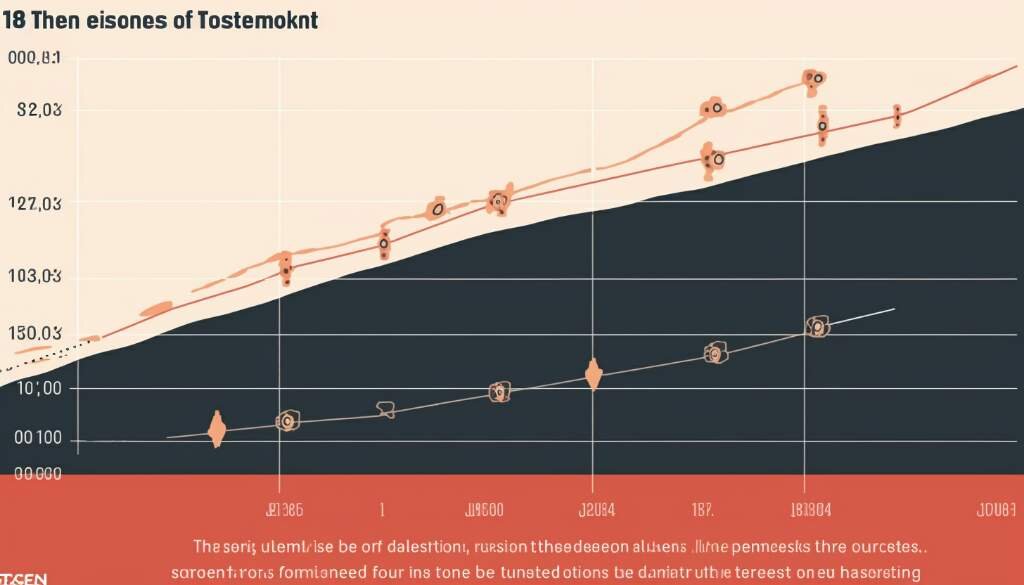
Introduction
Introduction
The topic of testosterone and its effects on body composition is a complex and intriguing subject. Testosterone is a hormone that plays a crucial role in various aspects of human health and well-being. Understanding the relationship between testosterone and body composition can provide insights into improving overall physical fitness, managing weight, and optimizing performance.
In this section, we will explore the effects of testosterone on body composition, the role of testosterone in aging, the impact of testosterone treatments on body composition, and the association between testosterone levels and body composition.
What is Testosterone?
Testosterone is a hormone that plays a crucial role in the development and maintenance of male sexual characteristics. It is primarily produced in the testes, although a small amount is also synthesized in the adrenal glands. Testosterone belongs to a class of hormones called androgens, which are responsible for promoting the development of male secondary sexual characteristics such as a deeper voice, facial and body hair growth, and increased muscle mass.
Beyond its role in sexual development, testosterone also plays a significant role in body composition. It is involved in the regulation of muscle mass, bone density, and fat distribution. Testosterone promotes the development of lean muscle mass, and it helps to reduce body fat. These effects on body composition are important for both men and women, as they contribute to overall health and well-being.
Testosterone levels can vary between individuals and may fluctuate throughout a person's lifetime. In men, testosterone levels are typically highest during adolescence and early adulthood. After the age of 30, testosterone levels gradually decline. This decline in testosterone levels with age can have implications for body composition, as it may contribute to the loss of muscle mass and the accumulation of body fat that often occurs with aging.
In addition to age-related changes, testosterone levels can also be influenced by various factors such as genetics, lifestyle, and underlying health conditions. Low testosterone levels, also known as hypogonadism, can impact body composition by reducing muscle mass and increasing body fat.
Understanding the role of testosterone in body composition is essential for developing strategies to optimize body composition and promote overall health. Whether through natural means or hormone replacement therapies, maintaining optimal testosterone levels can help individuals achieve a healthy body composition and potentially minimize the negative impacts of aging on body composition.
Importance of Body Composition
Body composition refers to the proportion of fat, muscle, water, and other tissues in the body. It plays a crucial role in overall health and well-being. Maintaining a healthy body composition is important for various reasons.
Firstly, body composition affects physical performance and athletic abilities. Higher muscle mass and lower body fat percentage are generally associated with increased strength, endurance, and agility. This is because lean muscle tissue is responsible for generating force and power, while excess body fat can impede movement and decrease overall fitness.
Secondly, body composition influences metabolism. Muscle tissue is metabolically active and requires more energy to maintain, even at rest. Therefore, individuals with higher muscle mass tend to have a higher basal metabolic rate (BMR), meaning they burn more calories throughout the day. In contrast, excess body fat can slow down metabolism and lead to weight gain.
Furthermore, body composition affects overall body shape and aesthetics. Many people strive for a lean and toned physique, and achieving a favorable body composition is essential for this goal. By reducing body fat and increasing muscle mass, individuals can attain a more sculpted appearance.
Moreover, body composition is linked to various health outcomes. Excess body fat, especially visceral fat that accumulates around organs, increases the risk of chronic diseases such as heart disease, diabetes, and certain cancers. On the other hand, maintaining a healthy amount of muscle mass is associated with improved insulin sensitivity, better blood sugar control, and reduced risk of age-related muscle loss (sarcopenia).
Lastly, body composition can impact self-esteem and mental well-being. Many individuals feel more confident and satisfied with their appearance when they have a favorable body composition. This positive self-image can contribute to better mental health and overall quality of life.
In conclusion, body composition plays a critical role in physical performance, metabolism, aesthetics, health outcomes, and mental well-being. Achieving and maintaining a healthy body composition is important for individuals of all ages and backgrounds.
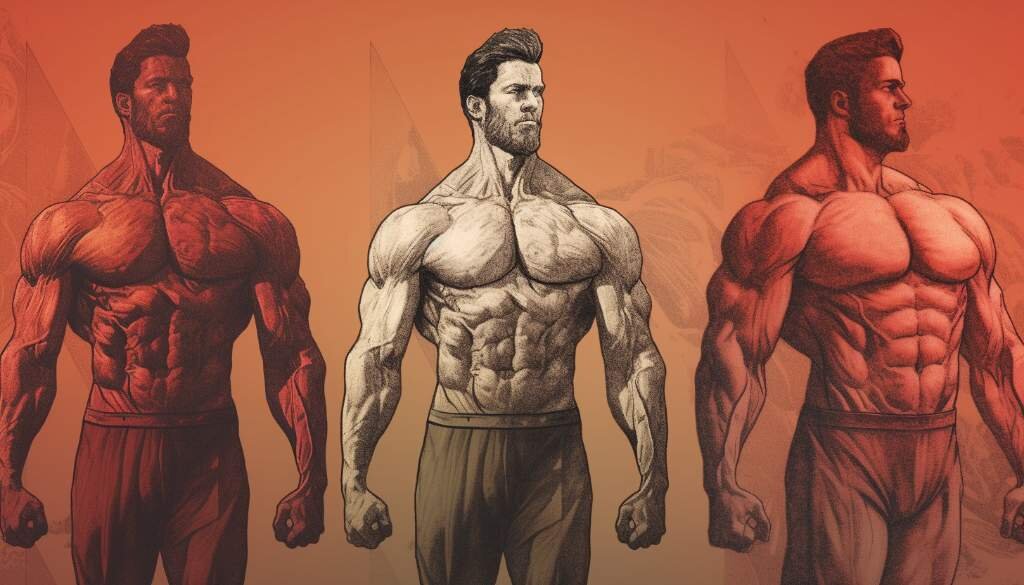
Effects of Testosterone on Body Composition
Testosterone plays a crucial role in regulating body composition, which refers to the distribution and proportion of different tissues in the body. Changes in testosterone levels have significant effects on various aspects of body composition, including lean muscle mass, body fat, and bone metabolism.
Testosterone has been found to promote an increase in lean muscle mass. It stimulates the synthesis of proteins in muscle tissue, leading to muscle growth and development. This effect is particularly important for individuals involved in strength training or physical exercise, as testosterone helps in building and maintaining muscle mass.
In addition to promoting muscle growth, testosterone also aids in the reduction of body fat. It has been observed that higher testosterone levels are associated with lower levels of body fat. Testosterone influences fat metabolism by increasing lipolysis, the breakdown of fat stored in adipose tissue, and inhibiting lipogenesis, the formation of new fat cells.
Furthermore, testosterone has an impact on bone metabolism. It helps in maintaining bone density by stimulating the activity of osteoblasts, the cells responsible for bone formation. Adequate testosterone levels are crucial for preventing age-related bone loss and reducing the risk of osteoporosis.
Increase in Lean Muscle Mass
When it comes to the effects of testosterone on body composition, one of the key changes that occur is an increase in lean muscle mass. Testosterone plays a crucial role in muscle development and maintenance, making it an essential hormone for individuals looking to build strength and improve their physique.
Testosterone stimulates protein synthesis in the body, which is the process that allows cells to build new proteins. With increased protein synthesis, the body has the necessary building blocks to repair and build muscle tissue. This leads to an increase in muscle mass over time.
Furthermore, testosterone promotes the growth of myocytes, which are the specialized cells that form muscle fibers. By stimulating myocyte proliferation and differentiation, testosterone enhances muscle growth and helps individuals achieve a more muscular physique.
In addition to promoting muscle growth, testosterone also improves muscle strength. It works by enhancing neuromuscular function, allowing muscles to contract more forcefully. This increased strength not only improves athletic performance but also contributes to better overall body composition.
It is important to note that while testosterone can have significant effects on lean muscle mass, its impact varies depending on factors such as genetics, age, and exercise regimen. Regular resistance training, combined with adequate protein intake, can maximize the muscle-building effects of testosterone.
In summary, testosterone plays a vital role in the development and maintenance of lean muscle mass. By stimulating protein synthesis, promoting myocyte growth, and enhancing muscle strength, testosterone helps individuals increase their muscle mass and improve their body composition.
Reduction in Body Fat
Testosterone plays a crucial role in shaping body composition and can have a significant impact on reducing body fat. When testosterone levels are optimal, it can lead to a decrease in overall body fat percentage.
One of the primary ways that testosterone reduces body fat is by increasing the metabolic rate. Testosterone stimulates the production of lean muscle mass, which is metabolically active and helps to burn calories even at rest. With an increase in lean muscle mass, the body becomes more efficient at using stored fat as an energy source.
Furthermore, testosterone has been shown to inhibit the formation of new fat cells while promoting the breakdown of existing fat cells. This mechanism contributes to the reduction of body fat, especially in areas such as the abdomen, thighs, and hips.
Studies have also shown that testosterone can improve insulin sensitivity and glucose metabolism. This means that testosterone not only aids in reducing body fat but also helps regulate blood sugar levels, which is essential for overall health and preventing conditions like diabetes.
It's important to note that the effects of testosterone on body fat reduction may vary from person to person. Factors such as age, genetics, lifestyle, and overall health can influence the individual response to testosterone therapy.
Changes in Bone Metabolism
When it comes to the effects of testosterone on body composition, changes in bone metabolism are a key aspect worth exploring. Testosterone plays a crucial role in maintaining bone health and density, which is important for overall physical strength and stability.
One of the primary ways that testosterone affects bone metabolism is through its stimulation of osteoblasts, which are cells responsible for bone formation. Testosterone promotes the activity of osteoblasts, leading to an increase in bone mineral density and overall strength. This is particularly important for individuals engaging in weight-bearing exercises or sports that require strong bones to support muscular movements.
Research has shown that low testosterone levels can contribute to the development of osteoporosis, a condition characterized by weak and brittle bones. In contrast, adequate testosterone levels can help maintain bone health and reduce the risk of fractures and osteoporosis.
Furthermore, testosterone also interacts with other hormones and growth factors that influence bone metabolism. For example, testosterone inhibits the activity of osteoclasts, which are cells responsible for bone resorption. By reducing bone resorption and increasing bone formation, testosterone helps maintain a balanced bone remodeling process.
It is important to note that the effects of testosterone on bone metabolism are not limited to men. Women also produce testosterone, although in smaller amounts, and it plays a similar role in maintaining bone health for them as well.
In summary, testosterone plays a vital role in bone metabolism by promoting bone formation, inhibiting bone resorption, and maintaining overall bone health. Adequate testosterone levels contribute to stronger bones, reduced risk of osteoporosis, and better physical performance.
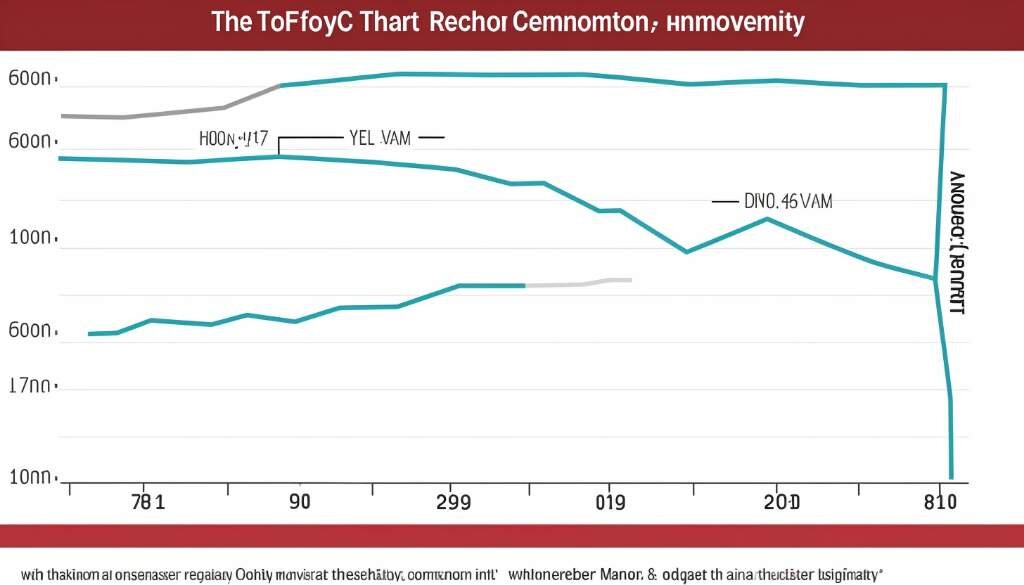
The Role of Testosterone in Aging and Body Composition
The Role of Testosterone in Aging and Body Composition
Testosterone plays a crucial role in both aging and body composition. As individuals age, there are changes in the levels of hormones in the body, including testosterone. Testosterone is an important hormone that impacts many aspects of health, including body composition.
In this section, we will explore the effect of aging on testosterone levels and the impact of testosterone on age-related changes in body composition. We will also delve into the potential benefits of testosterone treatments for individuals with low testosterone levels.
Effect of Aging on Testosterone Levels
Aging is a natural process that affects various aspects of our body, including hormone levels. Testosterone, in particular, experiences significant changes as we age. It is important to understand how aging impacts testosterone levels and its subsequent effects on body composition.
As men age, there is a gradual decline in testosterone levels. This decline typically starts around the age of 30 and continues to decrease year by year. By the time men reach their 70s, testosterone levels can be significantly lower compared to their younger years.
The decline in testosterone levels with age, known as age-related hypogonadism, can have a notable impact on body composition. One of the key effects is a decrease in lean muscle mass. Testosterone plays a vital role in the development and maintenance of muscle tissue. With lower testosterone levels, muscle mass tends to decrease, leading to a condition called sarcopenia.
Furthermore, the reduction in testosterone levels with age is also associated with an increase in body fat. Testosterone has a metabolic effect that helps regulate fat distribution in the body. As testosterone levels decline, the body tends to store more fat, especially in the abdominal region.
Another consequence of declining testosterone levels in older individuals is changes in bone metabolism. Testosterone is essential for maintaining bone health and density. As levels decrease with age, bone loss can occur, leading to a higher risk of osteoporosis and fractures.
It is worth noting that the decline in testosterone levels differs among individuals. While it is a normal part of the aging process, some individuals may experience a more significant decline, leading to lower testosterone levels than average. This condition is known as low testosterone or testosterone deficiency.
In conclusion, aging is associated with a decline in testosterone levels. This decline can have significant effects on body composition, including a decrease in lean muscle mass, an increase in body fat, and changes in bone metabolism. Understanding the role of testosterone in aging and its impact on body composition is crucial for developing targeted interventions and treatments to mitigate the negative effects of age-related hormonal changes.
Impact of Testosterone on Age-related Changes in Body Composition
As individuals age, there are several changes that occur in their body composition. Testosterone, a hormone primarily produced in the testes in men and in smaller amounts in the ovaries and adrenal glands in women, plays a significant role in these age-related changes. Testosterone levels naturally decline with age, which can have various effects on body composition.
One of the main impacts of declining testosterone levels on age-related changes in body composition is the loss of muscle mass, a condition called sarcopenia. Sarcopenia is characterized by a decrease in muscle size and strength, leading to functional limitations and increased risk of falls and fractures in older adults. Testosterone has been shown to play a key role in the maintenance and growth of muscle mass. It stimulates protein synthesis, which promotes muscle growth, and also inhibits the breakdown of muscle tissue. Therefore, with lower testosterone levels, older individuals may experience a decline in muscle mass.
In addition to muscle loss, declining testosterone levels can also contribute to an increase in body fat. Testosterone helps regulate fat metabolism by promoting the breakdown of stored fat and inhibiting the formation of new fat cells. With lower testosterone levels, the body's ability to efficiently burn fat decreases, leading to an accumulation of body fat.
Furthermore, the changes in body composition as a result of declining testosterone levels can also impact bone health. Testosterone plays a crucial role in maintaining bone density and strength. It stimulates bone formation by increasing the activity of bone-building cells called osteoblasts and inhibiting the activity of bone-resorbing cells called osteoclasts. As testosterone levels decline, the balance between bone formation and resorption is disrupted, leading to a decrease in bone density and an increased risk of osteoporosis and fractures.
In conclusion, the decline in testosterone levels that occurs with aging can have a significant impact on body composition. Older individuals may experience a loss of muscle mass, an increase in body fat, and a decrease in bone density. These changes can negatively affect overall physical health and increase the risk of age-related conditions. Understanding the role of testosterone in these age-related changes can help inform strategies for maintaining optimal body composition and promoting healthy aging.
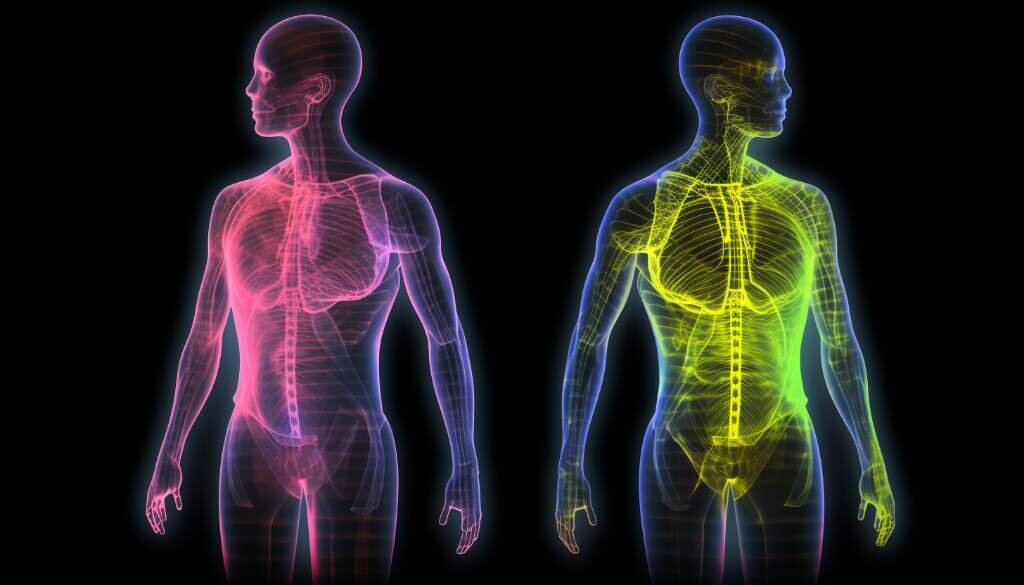
Testosterone Treatments and Body Composition
Testosterone Treatments and Body Composition
Testosterone treatments refer to the use of medications or therapies to increase testosterone levels in the body. These treatments are designed to address various conditions such as low testosterone levels, age-related decline in testosterone, obesity, and gender dysphoria. Body composition, on the other hand, refers to the proportion of different tissues in the body, including muscle mass, body fat, and bone density.
In this section, we will explore the effects of testosterone treatment on different population groups, including obese individuals, those undergoing gender-affirming hormone therapy, and those with low testosterone levels. We will also discuss the association between testosterone levels and body composition, focusing on the link between abdominal body composition and testosterone.
Effects of Testosterone Treatment on Obese Individuals
Testosterone treatment has been shown to have significant effects on body composition in obese individuals. Obesity is commonly associated with low testosterone levels, and testosterone therapy can help address this hormonal imbalance and promote positive changes in body composition.
One of the primary effects of testosterone treatment in obese individuals is an increase in lean muscle mass. Testosterone is an anabolic hormone that stimulates muscle protein synthesis, leading to muscle growth and development. By increasing testosterone levels, obese individuals can experience enhanced muscle growth, which can improve overall body composition and metabolic health.
In addition to increasing lean muscle mass, testosterone treatment can also lead to a reduction in body fat. Testosterone has been shown to enhance lipolysis, which is the breakdown of stored fat for energy. By promoting fat burning and reducing fat storage, testosterone therapy can help individuals with obesity achieve a healthier body composition.
Furthermore, testosterone treatment can have significant effects on bone metabolism in obese individuals. Osteoporosis, a condition characterized by low bone density and increased risk of fractures, is often associated with obesity. Testosterone has a positive impact on bone health by stimulating bone formation and increasing bone mineral density. By improving bone density, testosterone treatment can help reduce the risk of fractures and improve overall skeletal health in obese individuals.
Overall, testosterone treatment offers various benefits for obese individuals in terms of body composition. It promotes the growth of lean muscle mass, reduces body fat, and improves bone metabolism. These effects can contribute to improved physical appearance, increased strength and endurance, and better overall health. However, it is essential to consult with a healthcare professional before undergoing testosterone treatment to ensure it is safe and suitable for individual needs.
Exploring the Effects of Gender-Affirming Hormone Therapy
Gender-affirming hormone therapy (GAHT) is a medical intervention that aims to align an individual's physical characteristics with their gender identity. It involves the use of hormones, such as testosterone, to induce masculine or feminine characteristics in transgender individuals.
When it comes to body composition, GAHT can have a significant impact.
For transgender men undergoing masculinizing hormone therapy, testosterone plays a crucial role in enhancing male body composition. Testosterone promotes the development of lean muscle mass, increases bone density, and reduces body fat.
One of the main effects of GAHT in transgender men is the increase in lean muscle mass. Testosterone induces muscle protein synthesis, leading to the growth and development of muscle tissue. This can result in a more masculine physique with broader shoulders and increased muscle definition.
In addition to an increase in muscle mass, GAHT can also lead to a reduction in body fat. Testosterone helps to mobilize stored fat and promote its utilization for energy. As a result, transgender men may experience a decrease in overall body fat percentage, leading to a more defined and muscular appearance.
Furthermore, changes in bone metabolism are another effect of GAHT. Testosterone has a positive impact on bone density and mineralization, which can help prevent conditions such as osteoporosis and increase overall bone strength. This is especially important for transgender men who may have originally had lower bone density due to hormonal differences between sexes.
Overall, GAHT can significantly affect body composition in transgender men. It promotes the development of lean muscle mass, reduces body fat, and improves bone health. These changes can contribute to a more masculine appearance and improved physical well-being.
Potential Benefits for Individuals with Low Testosterone Levels
Individuals with low testosterone levels may experience a range of symptoms and health issues related to body composition. Low testosterone levels can contribute to an increase in body fat, a decrease in lean muscle mass, and changes in bone metabolism. However, testosterone treatments can offer potential benefits for individuals with low testosterone levels, helping to optimize their body composition.
One of the potential benefits of testosterone treatment is an increase in lean muscle mass. Testosterone plays a crucial role in muscle protein synthesis, which is the process of building new muscle fibers. By increasing testosterone levels, individuals with low testosterone can experience improvements in their ability to build and maintain lean muscle mass.
In addition to increasing muscle mass, testosterone treatment can also lead to a reduction in body fat. Testosterone helps regulate metabolism and fat distribution in the body. When testosterone levels are low, individuals may experience an increase in visceral fat, which is the fat that accumulates around the organs in the abdominal area. By increasing testosterone levels, individuals with low testosterone can decrease their body fat percentage.
Besides impacting muscle and fat, testosterone treatments can also have positive effects on bone metabolism. Low testosterone levels are associated with a higher risk of osteoporosis and bone loss. Testosterone therapy can help improve bone mineral density and reduce the risk of fractures in individuals with low testosterone levels.
In summary, individuals with low testosterone levels may benefit from testosterone treatments in terms of optimizing their body composition. Testosterone treatment can lead to an increase in lean muscle mass, a reduction in body fat, and improvements in bone metabolism. It is important to consult with a healthcare professional to determine the appropriate testosterone treatment plan based on individual needs and considerations.
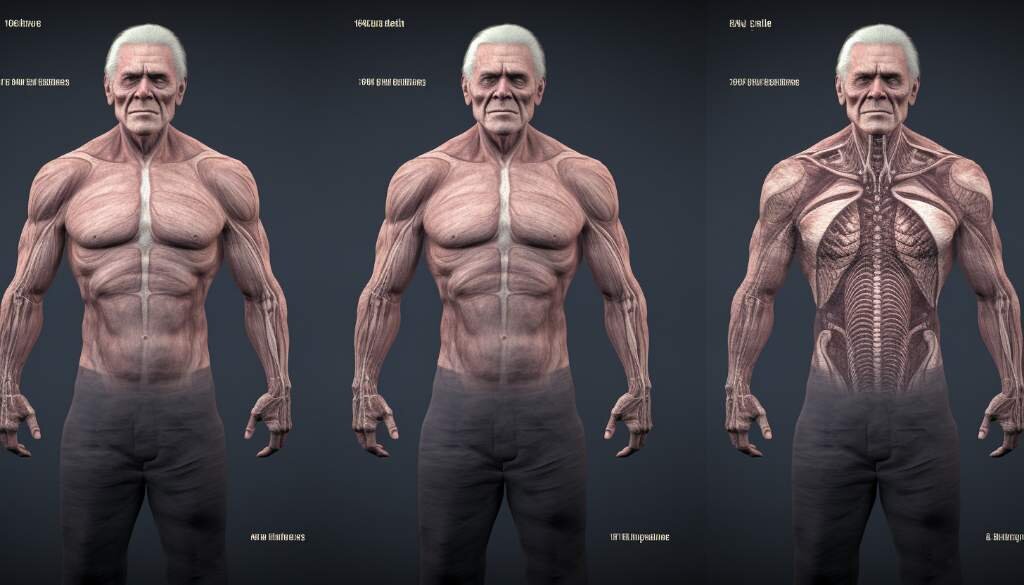
Association Between Testosterone Levels and Body Composition
The association between testosterone levels and body composition is a crucial aspect to understand the impact of this hormone on the human body. Testosterone is a hormone primarily produced in the testes in males and to a lesser extent in the ovaries in females. It plays a significant role in the development and maintenance of male reproductive tissues and secondary sexual characteristics.
In recent years, research has shown that testosterone levels have a profound effect on body composition. Body composition refers to the proportion of fat, muscle, and bone in the body. Understanding the association between testosterone levels and body composition is essential for comprehending the impact of testosterone on overall health and wellbeing.
In the following sections, we will explore research findings and the relationship between testosterone levels and body composition. We will delve into topics such as the effects of testosterone treatment on obese individuals, the potential benefits for individuals with low testosterone levels, and the impact of testosterone on age-related changes in body composition.
Research Findings on the Relationship Between Testosterone and Body Composition
Research findings have shown that there is a clear relationship between testosterone levels and body composition. Testosterone plays a significant role in influencing the distribution of fat and the development of muscle mass in the body.
One key aspect of testosterone's effect on body composition is its ability to increase lean muscle mass. Studies have consistently demonstrated that higher testosterone levels are associated with greater muscle mass. Testosterone stimulates protein synthesis and enhances muscle protein metabolism, leading to increased muscle growth and repair.
Furthermore, testosterone also plays a crucial role in reducing body fat. It acts as a regulator of lipid metabolism, promoting the breakdown of stored fat and inhibiting the accumulation of new fat cells. This results in a decrease in overall body fat percentage.
While the impact of testosterone on lean muscle mass and body fat is well-established, research has also explored its effects on bone metabolism. Testosterone has been found to have a positive influence on bone density and strength, particularly in men. It promotes bone formation and mineralization, reducing the risk of osteoporosis and fractures.
Several studies have examined the effects of aging on testosterone levels and their subsequent impact on body composition. As men age, testosterone levels naturally decline. This decline in testosterone is associated with changes in body composition, including decreased muscle mass and increased body fat percentage.
Some studies have suggested a reciprocal relationship between testosterone and body composition changes associated with aging. It is believed that the decline in testosterone may contribute to age-related changes in body composition, while the changes in body composition themselves can further decrease testosterone levels. This emphasizes the importance of maintaining healthy testosterone levels to preserve muscle mass and manage body composition as individuals age.
In terms of testosterone treatments, research has shown that testosterone therapy can have positive effects on body composition, particularly in obese individuals. Testosterone replacement therapy has been found to promote a significant reduction in body fat and an increase in lean muscle mass, leading to improved body composition.
Additionally, testosterone therapy has also been explored in the context of gender-affirming hormone therapy. For individuals undergoing gender transition, testosterone hormone therapy can lead to changes in body composition that align with their gender identity. This includes increased muscle mass and a decrease in body fat percentage.
Furthermore, individuals with low testosterone levels may benefit from testosterone therapy to improve their body composition. This is particularly true for individuals with conditions such as hypogonadism, where testosterone production is impaired. Testosterone replacement therapy can help maintain or restore lean muscle mass and reduce body fat in such cases.
Overall, research findings consistently support the association between testosterone levels and body composition. Testosterone plays a vital role in maintaining optimal body composition, including lean muscle mass, body fat percentage, and bone density. Understanding the relationship between testosterone and body composition can inform interventions and treatments aimed at optimizing overall health and well-being.
Linking Abdominal Body Composition to Testosterone Levels
When it comes to body composition, testosterone plays a crucial role. One specific aspect that has been extensively studied is the link between testosterone levels and abdominal body composition. Abdominal body fat, also known as central obesity, is a type of fat that accumulates around the waist and abdomen. It is often associated with an increased risk of various health conditions including cardiovascular disease, diabetes, and metabolic syndrome.
Research has shown that testosterone levels have a significant impact on the distribution of body fat, particularly in the abdominal region. Low testosterone levels have been associated with an increased accumulation of abdominal fat, while higher levels of testosterone have been linked to a reduction in abdominal fat.
A study published in the Journal of Clinical Endocrinology and Metabolism found that men with lower testosterone levels tend to have higher levels of abdominal fat. This is believed to be due to the influence of testosterone on lipid metabolism, insulin sensitivity, and fat storage. Testosterone helps to regulate the balance between fat storage and fat breakdown, and when testosterone levels are low, fat accumulation in the abdominal region can occur.
Furthermore, higher levels of abdominal fat have been found to be associated with lower testosterone levels. Abdominal fat, especially visceral fat which surrounds important organs in the abdominal cavity, produces enzymes that convert testosterone into estrogen. This leads to a decrease in testosterone levels, creating a vicious cycle where low testosterone promotes abdominal fat accumulation, and excess abdominal fat further lowers testosterone levels.
It is important to note that the relationship between testosterone levels and abdominal body composition is not limited to men. Women also experience changes in body composition and sex hormone levels with age. Although women have much lower testosterone levels compared to men, a decline in testosterone can still contribute to increased abdominal fat in women.
While the exact mechanisms underlying the relationship between testosterone and abdominal body composition are still being explored, it is clear that there is a strong connection. Maintaining optimal testosterone levels through lifestyle factors such as regular exercise, healthy diet, and stress management may help prevent or reduce abdominal fat accumulation, promoting a healthier body composition and potentially reducing the risk of associated health conditions.








